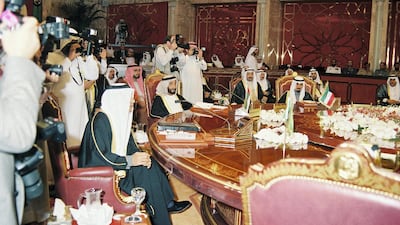Forty-three years ago, Gulf leaders were preparing to sign a document that would become arguably the most important charter of the region’s history.
The concept of a union among the Gulf states had been gaining momentum for some time, especially as countries in the region started to assert more influence and economic potential. In 1977, Sheikh Jaber, then Ruler of Kuwait, met with the UAE’s Founding Father, the late Sheikh Zayed, and the two discussed the idea of creating a formal alliance with Saudi Arabia, Bahrain, Oman and Qatar.
The idea became a reality in May 25, 1981 – at what was Abu Dhabi’s newest and most luxurious hotel, the InterContinental Hotel Abu Dhabi.

Leaders of Saudi Arabia, Kuwait, Bahrain, Qatar and Oman met with Sheikh Zayed in the hotel’s ballroom. They were seated at a round table, surrounded by plush leather chairs, that had a document written in Arabic in the centre. An emblem portraying six Gulf nations on a borderless map was hung on the wall.
The Arab world beyond the peninsula was in the throes of turmoil. Iran and Iraq were in the first year of a bloody war that would continue to rage until 1988. In 1979, extremists had seized the Grand Mosque in Makkah and the Iranian Revolution had unseated the monarchy of the Shah, and Ayatollah Ruhollah Khomeini became the country’s supreme leader. Egypt and Syria, meanwhile, were still reeling from the repercussions of the 1973 war with Israel.
Uncertainty was the dominant sentiment in the region. There was a need to revitalise notions of solidarity and to provide a beacon of hope and stability.
Sheikh Zayed initiated the meeting with a sentence that still rings with the symbolism of the union. “What the Arab world expects of us is serious solidarity, co-operation and loyalty.”
The union was also necessary for self-sovereignty. Superpowers, including the US and the Soviet Union were both seduced by the sudden rise of wealth in the Gulf and saw the region had a strategic place in their interests. As the Kuwaiti newspaper Al Rai Al Aam reported: “The Gulf leaders know we live in a wild world, one in which oil attracts sharks in the manner of blood.” A union was needed to keep the sharks at bay.
At 7.55pm on Monday, May 25, 1981, the charter was signed, effectively forming the Gulf Co-operation Council. The charter was “a declaration of intent but also of identity”, James Langton wrote in a piece last year for The National.
As the founding father of the UAE, Sheikh Zayed knew the importance of unity. The creation of the GCC was the logical next step.
“We are entitled to our lands and properties and we shall combine all our efforts to protect our countries, our peoples and our security,” Sheikh Zayed told Al Khaleej a few days after the signing of the charter. “We don’t want any country, big or small, interfering in our affairs or conducting their conflicts on our soil, air and seas.”
Although the leaders who signed the GCC charter at the InterContinental in 1981 have since died, the last being Oman’s Sultan Qaboos in 2020, the union they created continues.
The GCC has led the region through several trying periods in the past four decades. These include Saddam Hussein's invasion of Kuwait in 1990, with the UAE and Saudi Arabia participating in its liberation. The event was a grave reminder as to why a joint military force, the Peninsula Shield, was created in 1984 as a way to deter aggression against member states.
Another important aspect of the union comes at an economic level, which resonates on an individual level. Citizens of the six member states benefit from a single market that gives common access rights for employment, health care, retirement benefits, property ownership and education.
The 44th summit was held on December 5, in which the council discussed topics related to the Israel-Gaza war, the earthquake that struck Morocco in September and the achievements of the UAE’s space programme and its hosting of Cop28. The organisation also discussed issues related to environmental protection and climate change.


